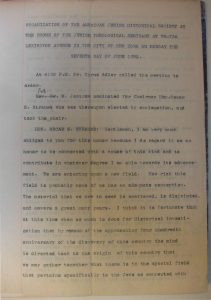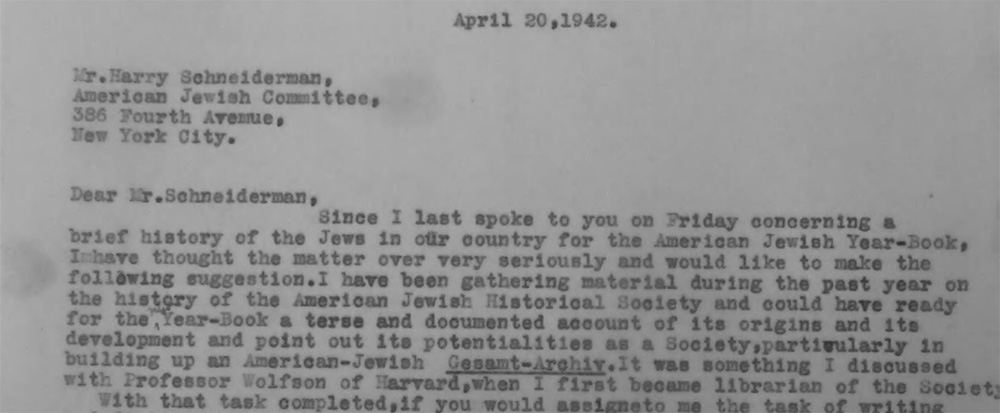When the American Jewish Historical Society (AJHS) was established in 1892, it was one of the first ethnic historical societies in the United States. It has been more than 120 years since its founding, and the AJHS remains one of the most prominent Jewish historical institutions. It holds invaluable collections, publishes American Jewish History, the preeminent journal of American Jewish historical studies, and serves as one of the partner institutions of the Center for Jewish History.
Nevertheless, at the outset the AJHS did not have an archive of its own. That is not to say that the founders of the AJHS were unaware of archives or uninterested in them. By the contrary, when the rabbi Abram S. Isaacs (1851-1920) called in 1886 for the writing of the history of American Jews, Cyrus Adler—who later initiated the inaugural 1892 meeting of the AJHS—declared that it must be done upon the basis of the “careful painstaking collection of the ‘sources’ of history.”[1]Cyrus Adler, “A History of the Jews in America,” The Jewish Messenger, 3 Dec. 1886. About two years later, in 1888, when the Chicago rabbi Bernard Felsenthal called on Adler to create a “Jewish Historical Society,” he spoke specifically about gathering historical materials from archives.[2]Bernard Felsenthal to Cyrus Adler, 6 July 1888, quoted in “The Sources of American Jewish History,” The Menorah Monthly, Sept. 1888. And at the inaugural meeting of the AJHS in 1892, numerous scholars talked about studying materials in archives, but only one figure, Moritz Ellinger of New York, spoke of creating “a library” or other permanent fashion to collect and register the material they might collect.[3]Meeting minutes, Organization of the American Jewish Historical Society, 7 June 1892, AJHS I-1, 109/30, p. 18.

Indeed, much of the work of the AJHS in its first years focused on publishing historical material and encouraging members to pursue their own research, rather than building up a collection of its own. Most of what it did acquire in these first years was received in exchange with other groups. It would only be in 1903 that the AJHS moved towards having a more permanent collection, after they secured space in the building of the Jewish Theological Seminary in New York and hired Leon Huhner as their “curator.” In addition, the events of the Kishinev pogrom pushed them to re-engage with a mission of collecting historical materials as well as those relating to current events.[4]Address of the President, Cyrus Adler, Publications of the American Jewish Historical Society 12, p. 2.
Within a half-century of the founding of the AJHS, though, archival collecting became much more central to the group’s mission. In 1942 and again in 1943, Isidore S. Meyer, the group’s librarian, called repeatedly for the formation of a “Gesamt-archive” of American Jewish history, actively referencing the leading Jewish archival institution of the Gesamtarchiv der deutschen Juden.

Around this same time, a group of leading Jewish scholars including Salo Baron of Columbia, Harvard’s Oscar Handlin, and Jacob Rader Marcus at the Hebrew Union College all sought to transform the AJHS into a more scholarly organization. In their view, the AJHS under A.S.W. Rosenbach had become a haven of amateurs, more interested in whether or not Columbus had been a Jew (he was not) than in the scholarly study of American Jewish history. In this context, Baron called in 1949 for the continued collecting of historical materials, and Marcus created his own American Jewish Archives at HUC in 1947. Lee M. Friedman, who took over the AJHS in 1948, used his inaugural address, “An Invitation to American Jewish History,” as a call for American Jews to preserve their historical materials and study them.
Despite the proclamations of these leading scholars who feared that the AJHS had languished, over the years the group had acquired quite a collection, leading Meyer to repeatedly complain that they simply did not have enough space for their files.[5]Memorandum: Housing Needs of the AJHS, 17 May 1949, AJHS I-1 109/17 Throughout the 1950s, the group grappled with what to do about this major issue. After the 1957 passing of Lee Friedman, the AJHS became one of the largest beneficiaries of his estate, totalling more than $1.5 million. All of a sudden, the group’s future was secured and they began a process of trying to determine where to build their own building that would have sufficient space for their stacks and allow for scholarly research.
After nearly a decade of furious debate, the group relocated to Brandeis University in 1968, where it would be based until it joined the Center for Jewish History. The AJHS still retains an office at the New England Historic Genealogy Society, in downtown Boston, blocks from the Public Garden, where they retain records relating to Jewish history in New England. All of the other files have been relocated to New York City.
Prominent collections include:
- Records of the American Jewish Congress (over 900 linear feet)
- Papers of Louis Marshall
- Materials relating to Soviet Jewry
- Records of the National Foundation for Jewish Culture
Research Notes
The files of the American Jewish Historical Society can be consulted at the Center for Jewish History, and in Boston. Finding aids can be consulted on the AJHS website.
The Boston location: Formerly known as the American Jewish Historical Society–New England Archives (AJHS–NEA), in 2015 it partnered with the New England Historic Genealogical Society to form the Wyner Family Jewish Heritage Center at New England Historic Genealogical Society.The Jewish Heritage Center holds the AJHS records at its core, and is adding new collections, now totalling over 2,000,000 records.
Collections are generally labeled P-xx (for personal collections), and I-yy (for institutional collections).
At the CJH, the AJHS’ files can be photographed free of charge, but not scanned.
The AJHS offers research fellowships for scholars using their archival materials.
Further Reading
- Jason Lustig. “Building a Home for the Past: Archives and the Geography of American Jewish History.” American Jewish History 102, no. 3 (2018): 375–99.
- Nathan Kaganoff. “AJHS at 90: Reflections on the History of the Oldest Ethnic Historical Society in America.” American Jewish History 71, no. 4 (July 1982): 466–85.
- Jeffrey Gurock. “From Publications to American Jewish History: The Journal of the AJHS and the Writing of American Jewish History.” American Jewish History 81, no. 2 (1993): 155–270.
- Elisabeth Kaplan. “We Are What We Collect, We Collect What We Are: Archives and the Construction of Identity.” The American Archivist 63, no. 1 (2000): 126–51.
References
| ↑1 | Cyrus Adler, “A History of the Jews in America,” The Jewish Messenger, 3 Dec. 1886. |
|---|---|
| ↑2 | Bernard Felsenthal to Cyrus Adler, 6 July 1888, quoted in “The Sources of American Jewish History,” The Menorah Monthly, Sept. 1888. |
| ↑3 | Meeting minutes, Organization of the American Jewish Historical Society, 7 June 1892, AJHS I-1, 109/30, p. 18. |
| ↑4 | Address of the President, Cyrus Adler, Publications of the American Jewish Historical Society 12, p. 2. |
| ↑5 | Memorandum: Housing Needs of the AJHS, 17 May 1949, AJHS I-1 109/17 |